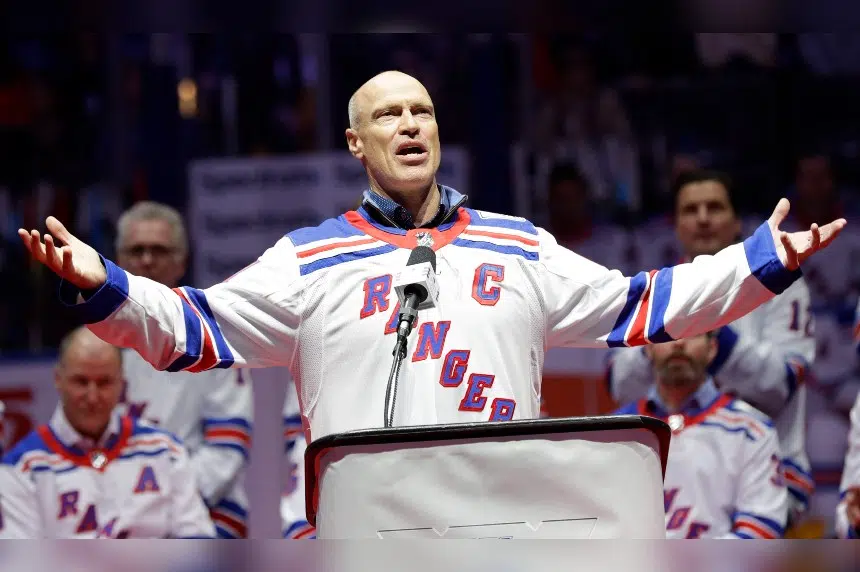Mark Messier’s impressive résumé guaranteed his induction into the Hockey Hall of Fame.
His famous guarantee — and delivering on it — didn’t hurt his legacy either.
With his New York Rangers down three games to two to the New Jersey Devils in the 1994 Eastern Conference final, Messier publicly said the Rangers would win Game 6 of the NHL playoff series.
He then backed up his bold promise, scoring a hat trick in the Rangers’ 4-2 victory in Game 6. New York subsequently won Game 7 in double overtime to reach the Stanley Cup final.
Led by their captain, the Rangers beat the Vancouver Canucks in six games to win their first Stanley Cup in 54 years.
“You have to believe you can win,” Messier, 60, told the Green Zone when asked about the guarantee. “You have to believe that you’ve got the right direction. You have to believe in the coach, you have to believe in the management, you have to believe in ownership, you have to believe in your teammates — you have to believe in everything.
“Belief is the No. 1 factor for a team’s run to a championship starting in September. Of course, that’s going to be tested all the time. That’s always going to be taxed and that’s where leadership really plays a major role to keep everybody on task and, when things aren’t going well, to concentrate on certain things in order to get back on track.”
Messier finished his 25-year career with the third-highest regular-season point total in NHL history (1,887) and the second-most points in playoff history (295). He was named an all-star 15 times and won six Stanley Cup titles — and he’s considered one of the greatest leaders ever.
In fact, the NHL’s award for leadership on the ice and in the community is named after Messier. He’s the only player in NHL history to captain two teams — the Rangers and Edmonton Oilers — to Stanley Cup titles.
The guarantee was only part of Messier’s legacy as a leader. But he admitted he can’t identify any one thing that makes a good leader.
“Leaders don’t know everything,” Messier said. “Coaches make a million mistakes. Leaders make a million mistakes.
“The thing that separates the good coaches and the good leaders is that you’ve built a culture of trust with everybody and so when a mistake is made, the players or the people aren’t turning around and going, ‘Uh huh, you don’t know everything’ and they turn their back on you.
“(That’s different than) someone who has built that trust and (when) a mistake is made, everybody still believes in the vision and the way that we’re trying to get there. Then you self-correct, you admit your mistake, you show some humility and you move on.”
Messier said he learned many of his leadership skills watching his dad Doug, both at home and when Doug was coaching. Former Oilers head coach Glen Sather also showed Messier what was required to lead a team.
“When it was my turn to become a captain, I had seen a lot, learned a lot and was ready to take that leadership when Wayne left the Oilers,” Messier said, referring to the trade that sent Wayne Gretzky to the Los Angeles Kings. “It was a long process.
“I always say I’m so leery of putting young players in leadership roles because it’s not just about how good a hockey player they are or how talented they are. When you’re playing a team sport, a professional sport, it’s serious business. People’s lives are at stake. People’s families get uprooted when things don’t go well.
“To put that burden on a young player without enough water under the bridge to understand and how to position and how to speak to people and how to help people, it’s just such a wide-ranging amount of responsibilities, they just don’t know what they don’t know at that age.”
Messier has written a book entitled No One Wins Alone, but the 2007 inductee into the Hockey Hall of Fame said during his chat with Jamie Nye and Drew Remenda that no one leads alone either.
That said, Messier said what made hockey exciting for him was helping people believe in themselves and reach their potential.
He may have done that with his guarantee, which convinced the Rangers they could beat the Devils.
“We just needed to do what every team does on a run to a championship,” Messier said. “You look each other in the eye and you ask, ‘Are we done? Is that enough? Do we tap out or do we have more? Can we give more? Can we push harder?’
“To a man, we weren’t done. We were too close. We were able to go there and win Game 6, win an overtime game in Game 7 and then go on to win the Stanley Cup.
“Those kinds of moments happen not once during a run to a Stanley Cup but numerous times actually. We were able to face the challenge and overcome it.”
Hear the whole interview here.











